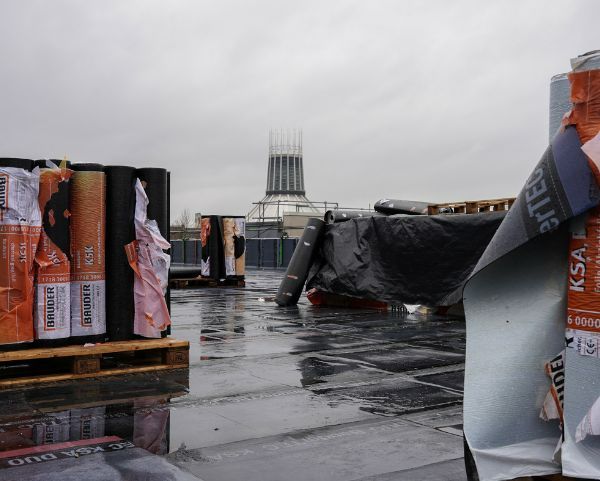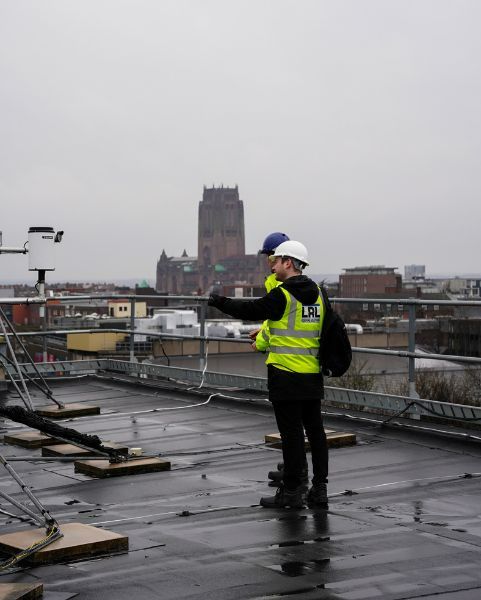Why Construction May Not (Must Not) be the Preserve of the 'Hairy-Arsed Roofer'
Having left university in 2016 as a freshly qualified English Literature graduate, you will forgive me for stating that construction, and specifically roofing, did not feature highly in my job search.
Like many people during the first wave of the pandemic, I found myself jobless. Business to business companies were struggling, and with the enforced closure of offices spaces my then role as a sales specialist was no more. Naturally, most of my frenzied job applications focused on the more conventional English graduate roles: copywriting, teacher training and marketing.
Yet, I seemed to be getting nowhere. It was a case of jobs applied for: 101. Responses: 2. Becoming ever more discouraged by the ‘must have three years’ experience’ constraints, I decided to broaden the pool. Construction was not immediately at the forefront my sector investigations. A quick scroll through graduate jobsites shows that the industry is not listed at all as a ‘typical employer’ for English grads. If asked, I’d have probably thought you require a specialised degree in architecture, engineering, or surveying to be successful in construction. In that way I’d have naively dismissed the UK’s largest industry by revenue at the drop of a (hard) hat.
Not only that, when thinking about construction as a whole I could not divorce the profession from getting your hands dirty, the smell of bacon butties on a cold winter’s morning, and, yes, the hairy-arsed roofer. Construction workers are often portrayed in the media as being tough, crass, and unapologetically macho. The type of men who delight in making women feel uneasy as they pass by the building site. That’s the stereotype of course, but one that is constantly perpetuated in popular culture.
Take, for example, the MoneySuperMarket campaign - funny because builders are performing outlandish dance moves that go against the so called toughman image.

Perfecting a Wolf-Whistle
Such stereotypes formed my mistaken perception of the whole industry, and perhaps they also form the basis of many more university graduates’ thinking up and down the country. So, when I received a phone call from a recruitment agency, asking if I would like to be considered for a position within a local roofing company, my immediate thought was how to perfect my wolfwhistle!
I then began to think how it might not be such a bad idea after all; especially as construction seemed to hold a certain level of economic immunity against COVID-19. Whilst many other sectors were struggling to stay afloat, the skyline of Manchester seemed to keep growing. With nothing to lose, I gave it a shot.
The position was for a new ‘Office Administrator’, not the most glamorous of titles, I’m sure you’ll agree, but it was nonetheless something I had solid experience in, and as long as I wasn’t spending eight hours a day cold calling customers and trying to upsell them something they didn’t necessarily need, it would be a plus.
Arriving at the office on my first day, I was pleasantly surprised to find that it wasn’t located in a converted shipping container just off the M60, but was a fairly modern outfit with good facilities and equipment. Swiftly, I was issued with my own company laptop, mobile phone, and branded jacket, immediately being made to feel an important member of the team.
This is in stark contrast to my previous position as an ‘Outbound Client Care Associate’ (essentially jargon for upselling) for a large American organisation, where I was one of many people performing the same duties within a bleak 50- seater office space. It was the kind of place many graduates are lured into with the promise of office incentives, break-room gimmicks, and a fridge full of beer at the end of the week.
Evidently, there are big differences in working for a global company and a SME based in Eccles, but only now could I see the benefits of joining a much smaller and tighter team within construction. Often the people that work for and run such companies have done so for a good few generations and they understand the business inside out. As the managing director explained, “Roofing isn’t something you choose you just sort of just end up here, it runs in the family more often than not.’’

Tartan Liquid Roofing
Being welcomed into a company when I had no industry knowledge of roofing, or indeed construction as a whole, was quite daunting, and I was still anxious about being asked to collect a ‘tin of tartan liquid roofing membrane’ on my first site visit. However, within my first couple of months of working for the business I was afforded many opportunities to learn and grow. I was quickly booked on a bid writing course and given the opportunity to define my own role - something that far outweighs a free bottle of Bud on a Friday afternoon.
Any fears of being mocked for lack of expertise soon subsided as I began to understand that I wasn’t brought in for my ability to felt a roof, or even to explain the intricacies of a liquid build up. Instead, I could use my specific skill set of writing, communication, and creativity to bridge a gap that tthe company had been lacking. On reflection, I held many laughable misconceptions of what the position would be, only six months ago.
A central part of my role now involves submitting tenders and helping the estimators win projects through bid writing. I have achieved a great sense of autonomy and respect that I would not have been able to find in the abundance of entry-level graduate jobs. For the first time in my career, I have been able to properly utilise my abilities learned during my degree in a way that leaves me feeling satisfied with the role I have played in helping secure a lucrative project.
Education is an integral part of improving the services that LRL offer. From CEO down, every member of staff undergoes regular personal development sessions, whether that be those on the tools, or indeed me, sitting behind the computer screen. Where before I had been given limited training in my previous roles, I am now able to speak with management about tailor-made development packages that benefit both myself and the business.
An oddly refreshing comment Rob made during my induction was that he doesn’t expect that I will be here in 10 years’ time. An unusual thing to say to someone who is just starting out but goes someway to show the honesty and sincerity of my new employer, and ultimately how he respects the two-way relationship being forged, shattering the myth that roofers are untrustworthy! Where other companies seem to demand that you sign away your working life to them, it was this kind of openness that I hadn’t been expecting to find in roofing.
LRL is keen to attract and employ driven and innovative people who will work hard for the company, but in return they have already offered me plenty of exciting opportunities during my short but hopefully continuing tenure. There are plenty of roles in construction that require somebody who is good with words, and the company has already helped me to define a clear careerpath in the industry with the prospect to earn good money as a bid writer in the long run.
Looking back, was it then a matter of image that put me off considering this industry?
Originally it was, but once you are welcomed into the roofing family you quickly come to realise that the people you work with are honest and hard-working, that you don’t necessarily have to know a thing about the different build-ups (you will learn) and that you can actually help grow the business in different and unique ways - you begin to feel at home. Witnessing something coming to fruition from the ground upwards, being built, staying there for decades and then being able to return and say, ‘Yes, I was a part of that’, is something you don’t get in other industries.
Our commercial manager summed up the industry best during my second site visit: “There’s a pride of work in construction’’, which left me thinking - the work achieved together, from estimating, planning, and finally constructing, creates a tangible and visual mark on the landscape of our great northern cities, and I for one am happy to be a part of this.








